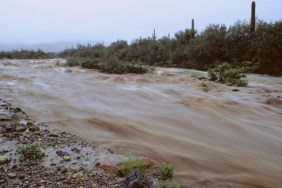Climate change gets real when people bear witness to the facts, when stories are told and consciousness is raised, then and only then, can change take place. With an understanding of this, photographer Gideon Mendel has traveled the world for evidence. From Thailand, Nigeria, and Germany to the United Kingdom, Brazil, and the United States, Mendel has spent the past decade documenting the global magnitude of climate change.
Also: Secret Histories | David T. Hanson: Wilderness to Wasteland
Using photography and video, Mendel travels the world to honor people who survived catastrophic floods. His works reveals what remains when the waters turn on you. With Mendel, survivors return to the deep flood waters that now occupy what once was their home, each one with a look of shock written on their face. So much is erased not only by the spaces, the objects, and the memories—but identity itself is submerged in the trauma of destruction.

Francisca Chagas dos Santos, Taquari District, Rio Branco, Brazil, March 2015.
A selection of this work is currently on view in Gideon Mendel: Drowning World at the Eli and Edythe Broad Art Museum at Michigan State University (Broad MSU), East Lansing, through October 16, 2016. The exhibition features “Water Chapters,” a 35-minute single-channel video that chronicles the daily routines of survivors continuing about their lives amidst flood waters that have devastated their corner of the countryside.
The exhibition also includes Mendel’s new “Watermarks” series, which reveals the devastating toll water takes on personal photographs. Mendel has created large-scale prints (nearly four feet in length) of these small, individual objects, amplifying the fragility of our lives. What was once a memento of a wonderful event has been transformed into evidence of the brutal impact of climate change, and its ability to erase everything in its path. The installation includes a presentation of the original found family snapshots that inspired the series, scattered across a platform and recalling how the objects were discovered in each home. It is a chilling reminder of the temporality of the physical world.

Christa and Salomon Raymond Fils. Decade Village. Haiti. September 2008.
Mendel’s work is a study in who and what remain, and the impact of trauma on the human landscape. It is almost as if time has stopped—indefinitely. The impact of natural disasters are slow to heal. Bearing witness becomes an act of immense courage: to return to the site of impact and discover just how bad the damage is. In many ways it is unfathomable, thus the looks of shock, sadness, and pain.
When we speak of climate change, we think of it as a future event and not as something happening in our lifetime, to which Mendel’s photographs attest. Let us heed its warning rather than bury our head in the sand. As Confucius observed, “By three methods we may learn wisdom: first by reflection, which is noblest; second, by imitation, which is easiest; and third, by experience is the bitterest.”

Shirley Armitage, Moorland Village, Somerset, UK, February 2014.
All photos: From Submerged Portraits Series from Drowning World by Gideon Mendel.
Miss Rosen is a New York-based writer, curator, and brand strategist. There is nothing she adores so much as photography and books. A small part of her wishes she had a proper library, like in the game of Clue. Then she could blaze and write soliloquies to her in and out of print loves.






